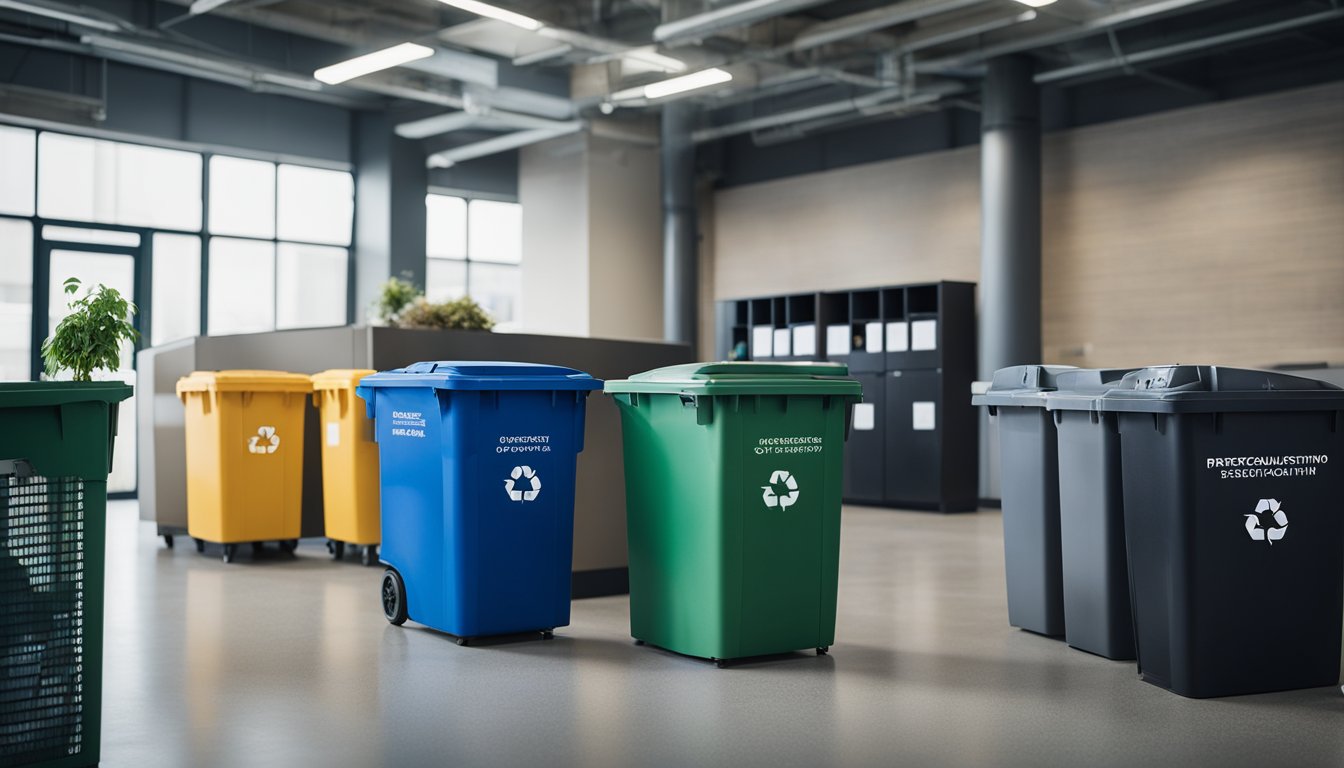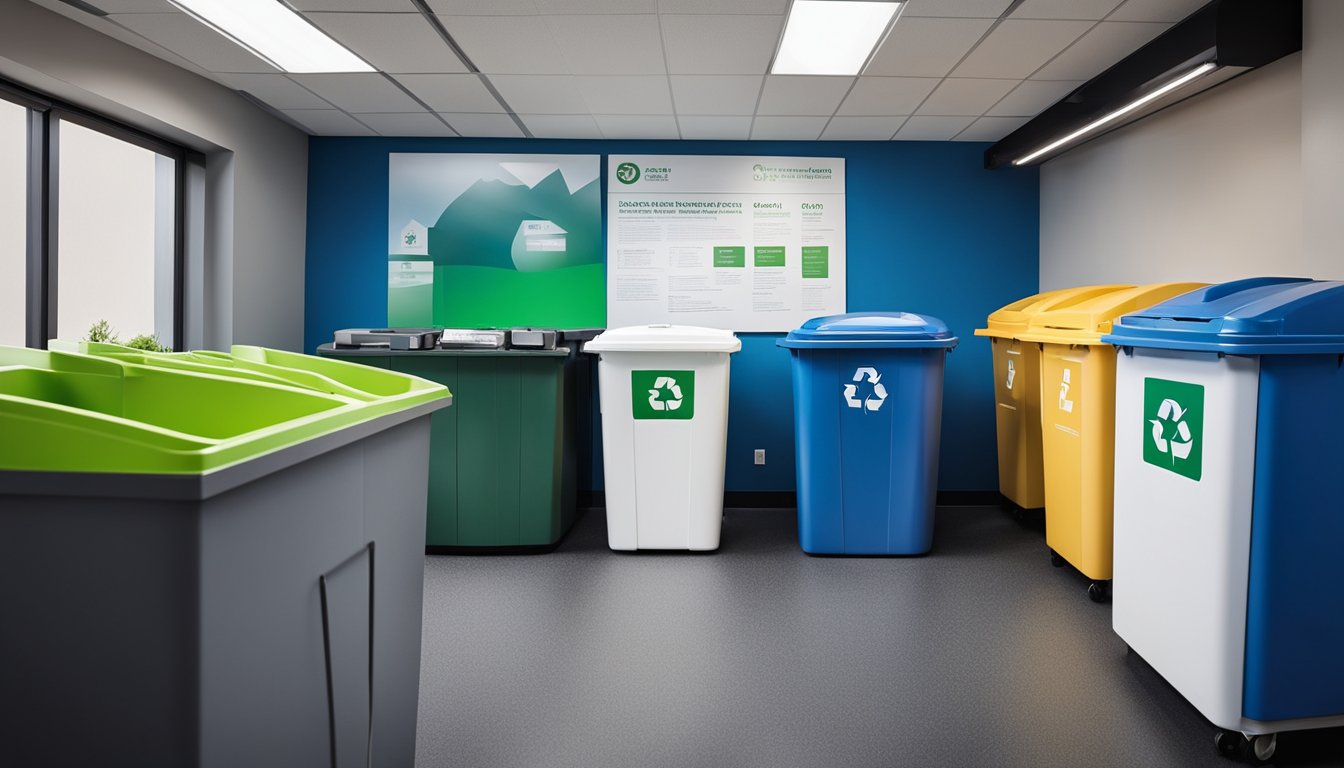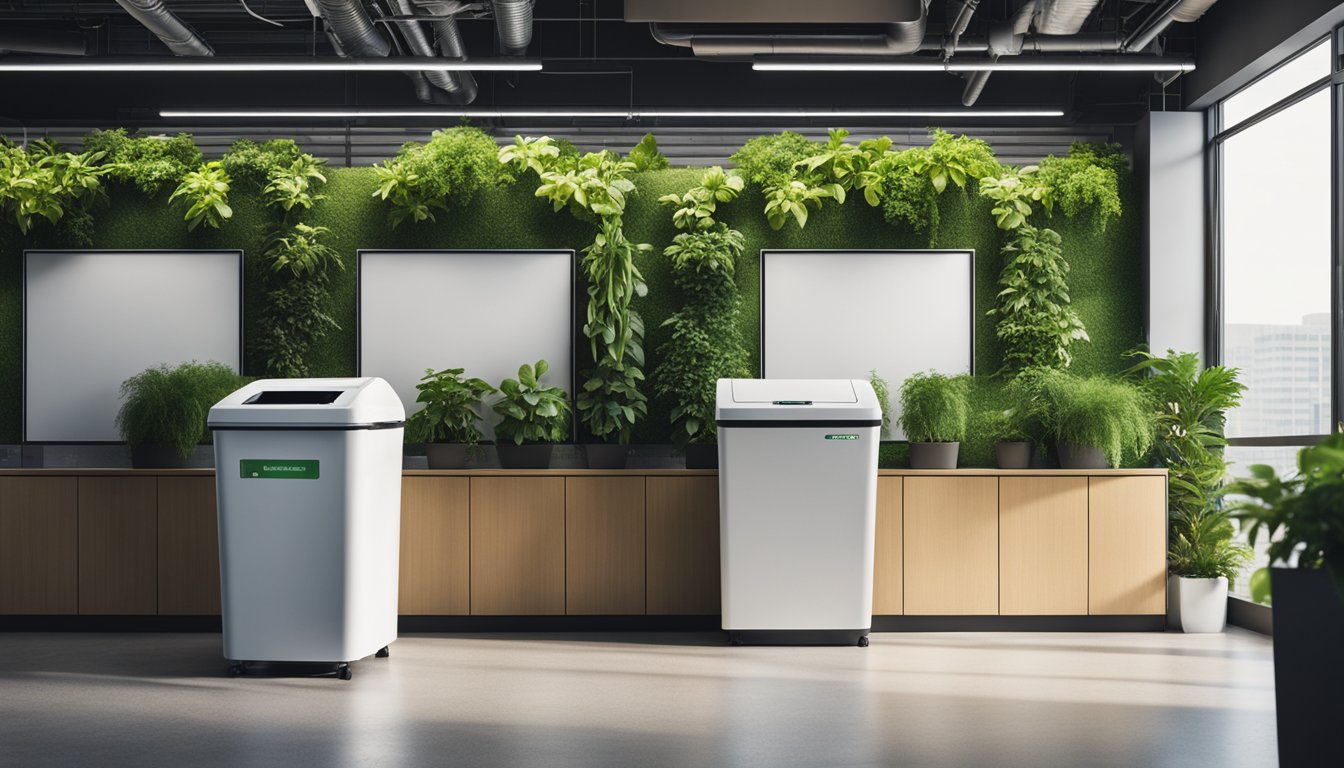Late updated: 06 Jan 2025 09:01
Written by: Sarah Hollister
Sustainable Waste Reduction Techniques For Offices: Effective Practices for a Greener Workspace
In today's rapidly evolving world, the quest for sustainability has never been more crucial, especially within office environments. Balancing operational efficiency with environmental responsibility can seem daunting, yet it is essential. Implementing sustainable waste reduction techniques not only minimises our carbon footprint but also paves the way for a sustainable future. By prioritising waste reduction strategies, we contribute to the health of our planet while fostering a positive workplace culture.

Our approach to office waste reduction begins with simple, effective steps. We must engage employees with initiatives like recycling programmes and challenges that encourage minimising waste. Adopting a digital-first mindset, such as transitioning from paper to electronic documents, significantly cuts down waste, adding another layer of resource conservation.
Moreover, working together to establish a zero-waste workplace setting involves actively redirecting waste streams away from landfills towards recycling and composting. By embracing these techniques, we create an impactful shift towards a more sustainable practice. Let's step forward with these practical and impactful strategies to lead the change.
Key Takeaways
- Sustainable waste reduction minimises our carbon footprint.
- Digital initiatives and recycling programmes are essential.
- Redirecting waste streams promotes a sustainable future.
Implementing Office Recycling Programmes
Implementing office recycling programmes can be achieved through strategic selection of recycling bins, innovation in recycling initiatives, and fostering employee involvement. By focusing on these elements, we can create a sustainable and effective waste management system. Let us explore each of these critical areas.
Choosing the Right Recycling Bins
Selecting the appropriate recycling bins is essential for efficient waste segregation. Bins should be clearly labelled with colour-coded signage indicating the type of recyclable material—paper, plastics, metal, glass, or electronic waste.
Positioning these bins strategically throughout the office is crucial. High-traffic areas such as kitchens, breakrooms, and near printers should have accessible bins. This encourages proper sorting without employees having to go out of their way, making recycling a natural, hassle-free action.
It's also important to choose bins that are eco-friendly and durable. Using bins made of recycled materials reinforces our commitment to sustainability. Redesigning waste flow in an approachable manner ensures that recycling becomes a seamless part of our office culture.
Developing Effective Recycling Initiatives
A waste audit is an excellent starting point to evaluate the types and volumes of waste our office generates. This analysis allows us to set practical, comprehensive recycling programme goals. Reducing single-use plastics and encouraging employees to use reusable products are impactful first steps.
Implementing a digital-first approach can also significantly cut down on paper waste. By adopting digital document storage and electronic communication, we reduce the need for printed materials, aligning with paperless initiatives. Meanwhile, e-waste recycling must not be overlooked; setting up dedicated collection days for electronic waste can streamline this process.
Continuous monitoring and adapting initiatives based on waste audit findings ensure these programmes evolve alongside our office’s needs. Offering incentives for departments with high recycling rates can further motivate engagement.
Engaging Employees in Recycling Efforts
Employee engagement is the backbone of any successful recycling programme. We should foster a culture of ownership and responsibility towards our recycling objectives. Workshops and seminars provide an educational foundation, enlightening staff on the impact of recycling and waste reduction.
Organising challenges and competitions between teams can inject an element of fun and increase engagement. Recognition and rewards for proactive participation and ideas can help galvanise our efforts. Furthermore, appointing recycling champions in each department serves as a constant reminder of sustainability goals.
By integrating these elements into the office culture, we can create an environment where recycling is second nature. This approach not only contributes to reducing our ecological footprint but also champions a broader commitment to corporate responsibility.
Reducing Waste and Conserving Resources

In our journey towards a sustainable office environment, focusing on waste reduction and resource conservation is essential. By implementing effective strategies in paper usage, purchasing habits, office management, and energy conservation, we can significantly decrease our carbon footprint and embrace zero-waste goals.
Strategies for Minimising Paper Usage
Minimising paper usage in the office requires proactive strategies. Encouraging digital documents over traditional paper ones is a significant starting point. Utilising shared online platforms allows staff to collaborate without paper dependence. Implementing double-sided printing as a default setting can reduce paper consumption.
We also promote using recyclable products such as notebooks and paper made from sustainable materials. Opting for these choices not only conserves natural resources but also aligns with sustainable practices aimed at reducing our environmental impact. Forming employee-led initiatives, like green teams, further inspires adherence to these practices.
Fostering Sustainable Purchasing Habits
Conscious purchasing is crucial for reducing waste. By prioritising items with reduced packaging, we can promote a circular economy. It is essential to choose products made from sustainable materials, which contribute to long-term cost savings. Reusable items, like water bottles, are preferred over disposable options.
We also encourage purchasing recyclable products. By choosing suppliers who share our sustainable goals, we enhance waste prevention. This approach supports a transition toward a more sustainable office, minimising our environmental footprint and promoting a responsible culture.
Transitioning to a Paperless Office
Going paperless represents a transformative step in office sustainability. Embracing digital alternatives, such as cloud storage and electronic signatures, allows us to eliminate paper processing. Implementing paperless workflows enhances both efficiency and environmental sustainability.
The emphasis is on easy access to digital tools, which facilitate seamless transitions without compromising productivity. Transitioning also involves training our staff, ensuring everyone is equipped and informed about the shift. We recognise the impact on our carbon footprint and work towards integrating fully digital operations.
Promoting Energy Conservation Practices
Energy conservation plays a crucial role in resource management. One effective practice is utilising natural light, reducing reliance on artificial lighting. Incorporating energy-efficient lighting options helps minimise energy consumption.
We adopt the use of smart thermostats and automation systems to manage office temperature effectively. Promoting awareness about unplugging devices when not in use is another key element. By fostering these habits, we enhance our commitment to sustainability and offer a more energy-conscious working environment.
Frequently Asked Questions

In the context of sustainable waste reduction in offices, there are several practical strategies, techniques, and procedures that can significantly reduce waste. By focusing on specific actions, businesses can work towards achieving zero waste and enhancing their sustainability efforts.
How can workplaces effectively minimise waste?
Workplaces can reduce waste by adopting digital solutions to decrease paper usage and implementing reusables instead of single-use plastics. Encouraging responsible purchasing and providing recycling facilities are also key steps in reducing the overall waste footprint.
What strategies are most effective for managing waste in office environments?
Effective waste management in offices can be achieved through the utilisation of recycling programmes, the implementation of composting for organic waste, and waste audits to identify areas of waste generation. Engaging employees in sustainable practices through education and awareness campaigns is also beneficial.
What procedures can be implemented to handle waste management in offices?
We can adopt procedures such as regular waste sorting to separate recyclables from general waste, establish clear waste management policies, and designate collection points for different waste types. Regular training sessions ensure that employees are familiar with these procedures.
Can you identify several waste reduction techniques for corporate settings?
Techniques include implementing paperless processes and using energy-efficient appliances. Encouraging carpooling, providing bicycle racks, and offering incentives for using public transport are steps that corporates can take to reduce waste associated with commuting.
What are the steps to achieving zero waste management in a business context?
Achieving zero waste involves a comprehensive review of all waste streams, setting ambitious waste reduction goals, and monitoring progress regularly. It requires integrating sustainable practices across all business operations and engaging both employees and suppliers in the process.
Which 'R's of waste reduction are most applicable to offices seeking sustainability?
Applying the principles of Reduce, Reuse, and Recycle is crucial. Offices should prioritise reducing consumption, reusing available resources, and promoting recycling efforts. Incorporating these 'R's into daily operations fosters a culture of sustainability and reduces environmental impact.
